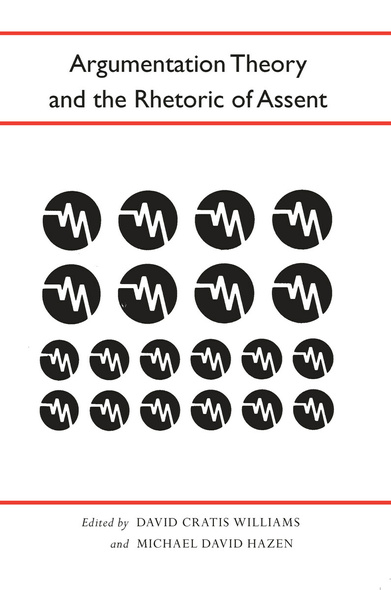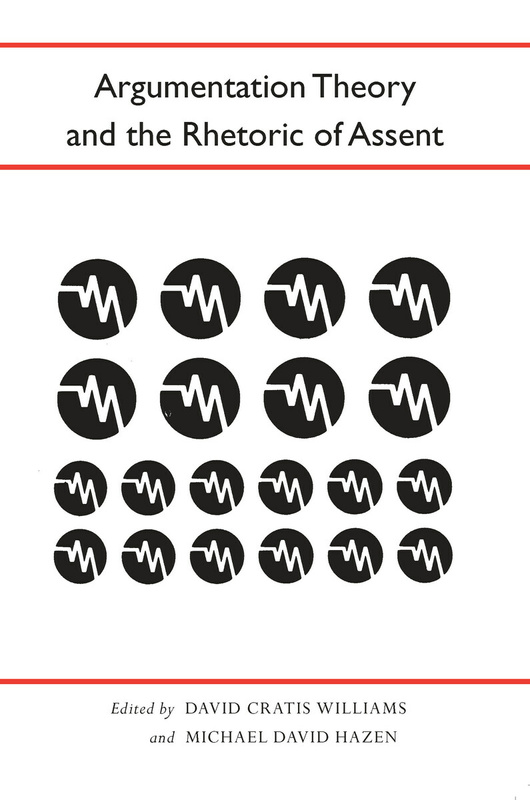Our shopping cart is currently down. To place an order, please contact our distributor, UTP Distribution, directly at utpbooks@utpress.utoronto.ca.
Argumentation Theory and the Rhetoric of Assent
Edited by David Williams and Michael David Hazen
University of Alabama Press
A collection of eleven essays presented at the 1982 Biennial Wake Forest University Argumentation Conference, held with the goal of establishing a recurring informal, small colloquium on argumentation theory at which both established and aspiring scholars in the area can present ideas to their colleagues with the prospect of the sort of intensive give-and-take critiques rare in larger conferences. This volume contains select essays that grew out of that interchange.
The eleven essays coalesce around the general question of "When, if ever, is assent justified?" And, as Professor Cox astutely notes in his introduction, such a question immediately leads into considerations of argument and power. In these considerations, many differing perspectives are represented in this volume: aesthetic and symbolist approaches, rationalistic and formalistic approaches, field theory perspectives, orientations toward various conceptualizations of a public sphere, etc.
Argumentation Theory and the Rhetoric of Assent is intended not as a primer on argument theory but rather as a look at American approaches to a philosophy of argumentation and argument criticism. As such, the essays probe the implications of both current practices and theoretical approaches: the objective is not to map the terrain argumentation theory has traversed in recent years but rather to plot a route for the direction in which argumentation studies should move. The concluding essays by James Arnt Aune and G. Thomas Goodnight confront these concerns explicitly.
The eleven essays coalesce around the general question of "When, if ever, is assent justified?" And, as Professor Cox astutely notes in his introduction, such a question immediately leads into considerations of argument and power. In these considerations, many differing perspectives are represented in this volume: aesthetic and symbolist approaches, rationalistic and formalistic approaches, field theory perspectives, orientations toward various conceptualizations of a public sphere, etc.
Argumentation Theory and the Rhetoric of Assent is intended not as a primer on argument theory but rather as a look at American approaches to a philosophy of argumentation and argument criticism. As such, the essays probe the implications of both current practices and theoretical approaches: the objective is not to map the terrain argumentation theory has traversed in recent years but rather to plot a route for the direction in which argumentation studies should move. The concluding essays by James Arnt Aune and G. Thomas Goodnight confront these concerns explicitly.
‘An important collection [with] a wealth of insights. . . . In recent years, students of public argumentation have noted with growing dismay that the adjudicative role traditionally assigned to the public in a democracy seems to have diminished significantly. The essays in this book address the factors responsible for this paradoxical state of affairs and offer provocative suggestions for the reclamation of the public sphere for the public. . . . The volume is a spirited reaffirmation of argumentaion's role in contemporary society.’ —Quarterly Journal of Speech
David Cratis Williams is assistant professor of Speech Communication at the University of Missouri, Rolla.
Michael David Hazen is professor of Speech Communication at Wake Forest University.
Preface vii
David Gratis Williams
Michael David Hazen
Introduction: Argumentation Theory as Critical Practice
1. Robert Cox 1
Part I. Rationality and Assent
2. The Centrality of Justification: Principles of Warranted Assertability
Raymie E. McKerrow 17
3. Realism and the Rhetoric of Assent
Earl Croasmun 33
Part II Form and Function in Assent: Descriptive Approaches
4. An Exploration of Form and Force in Rhetoric and Argumentation
James Jasinski 53
5. The Implied Arguer
Randall A. Lake 69
6. Metaphor and Presence in Argument
Charles Kauffman
Donn W Parson 91
7. Arguments in Fiction
Michael Weiler 103
Part III. Form and Function in Assent: Field Studies
8. Purpose, Argument Evaluation, and the Crisis in the Public Sphere
Robert C. Rowland 119
9. The Problem of the Public Sphere: Three Diagnoses
Charles Arthur Willard 135
Part IV. The Turn to Critical Advocacy
10. Cultures of Discourse: Marxism and Rhetorical Theory
James Arnt Aune 157
11. The Rhetorical Tradition, Modern Communication, and the Grounds of Justified Assent
G. Thomas Goodnight 173
References 196
Contributors 220
Index 222
David Gratis Williams
Michael David Hazen
Introduction: Argumentation Theory as Critical Practice
1. Robert Cox 1
Part I. Rationality and Assent
2. The Centrality of Justification: Principles of Warranted Assertability
Raymie E. McKerrow 17
3. Realism and the Rhetoric of Assent
Earl Croasmun 33
Part II Form and Function in Assent: Descriptive Approaches
4. An Exploration of Form and Force in Rhetoric and Argumentation
James Jasinski 53
5. The Implied Arguer
Randall A. Lake 69
6. Metaphor and Presence in Argument
Charles Kauffman
Donn W Parson 91
7. Arguments in Fiction
Michael Weiler 103
Part III. Form and Function in Assent: Field Studies
8. Purpose, Argument Evaluation, and the Crisis in the Public Sphere
Robert C. Rowland 119
9. The Problem of the Public Sphere: Three Diagnoses
Charles Arthur Willard 135
Part IV. The Turn to Critical Advocacy
10. Cultures of Discourse: Marxism and Rhetorical Theory
James Arnt Aune 157
11. The Rhetorical Tradition, Modern Communication, and the Grounds of Justified Assent
G. Thomas Goodnight 173
References 196
Contributors 220
Index 222





